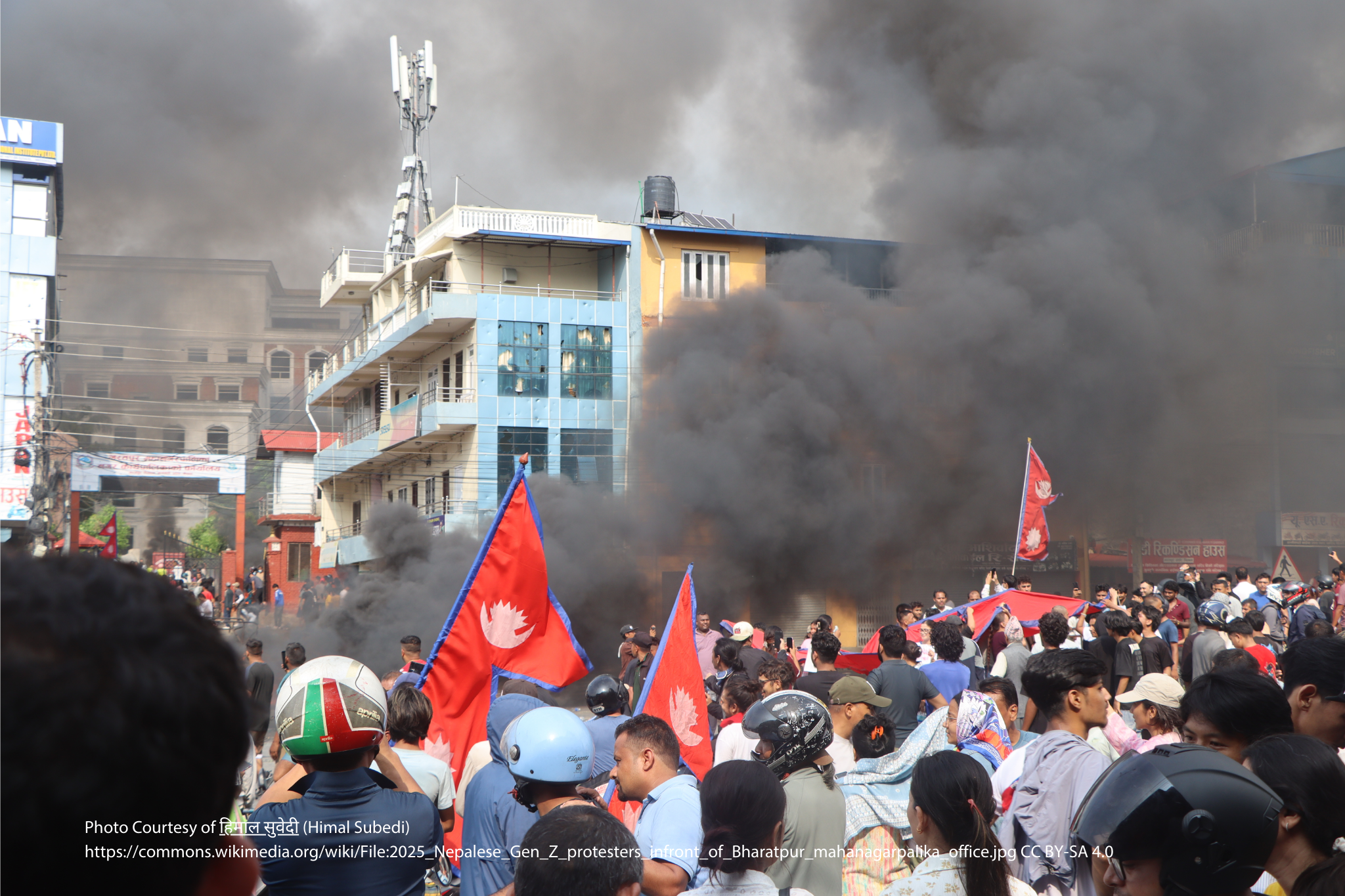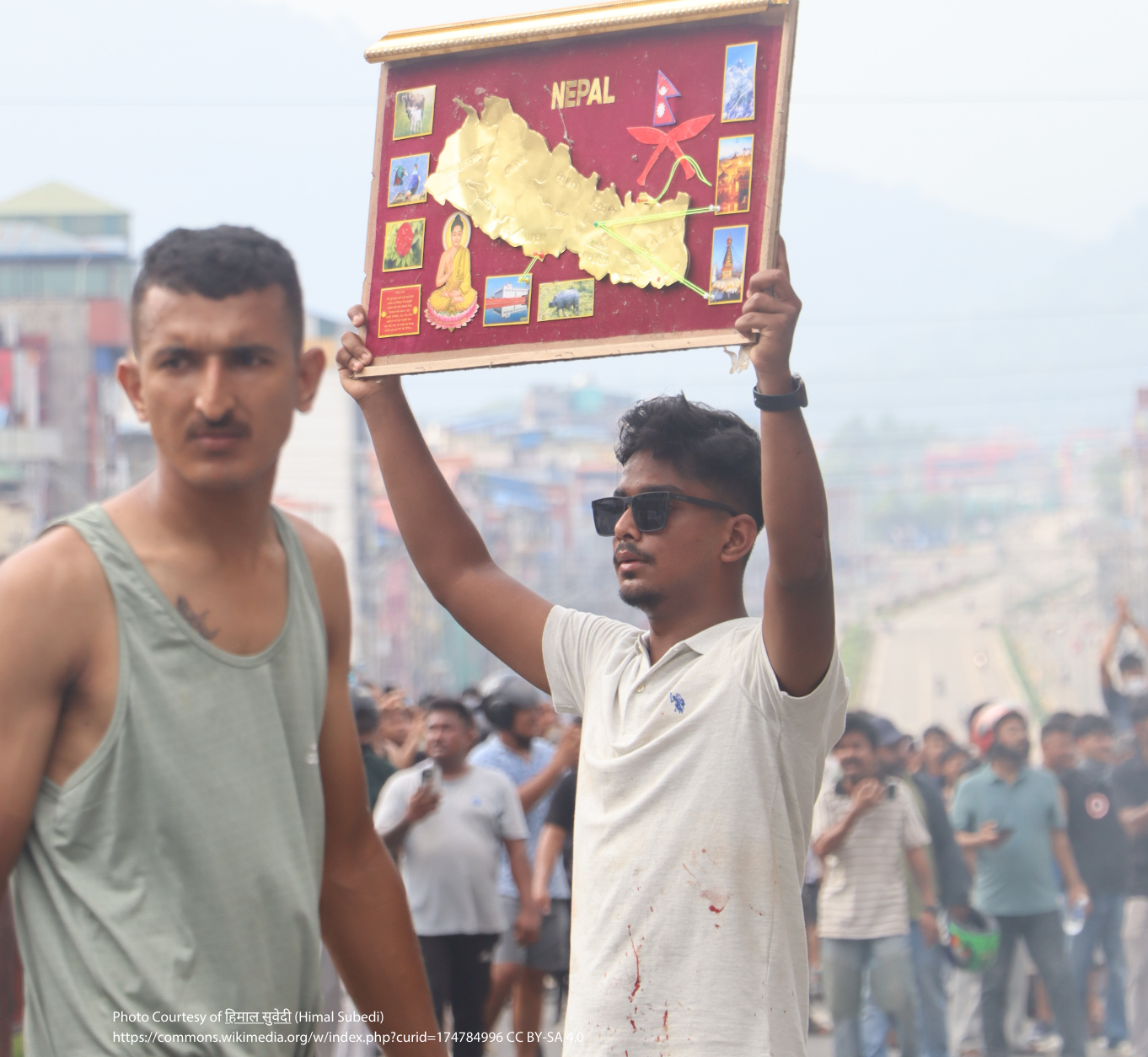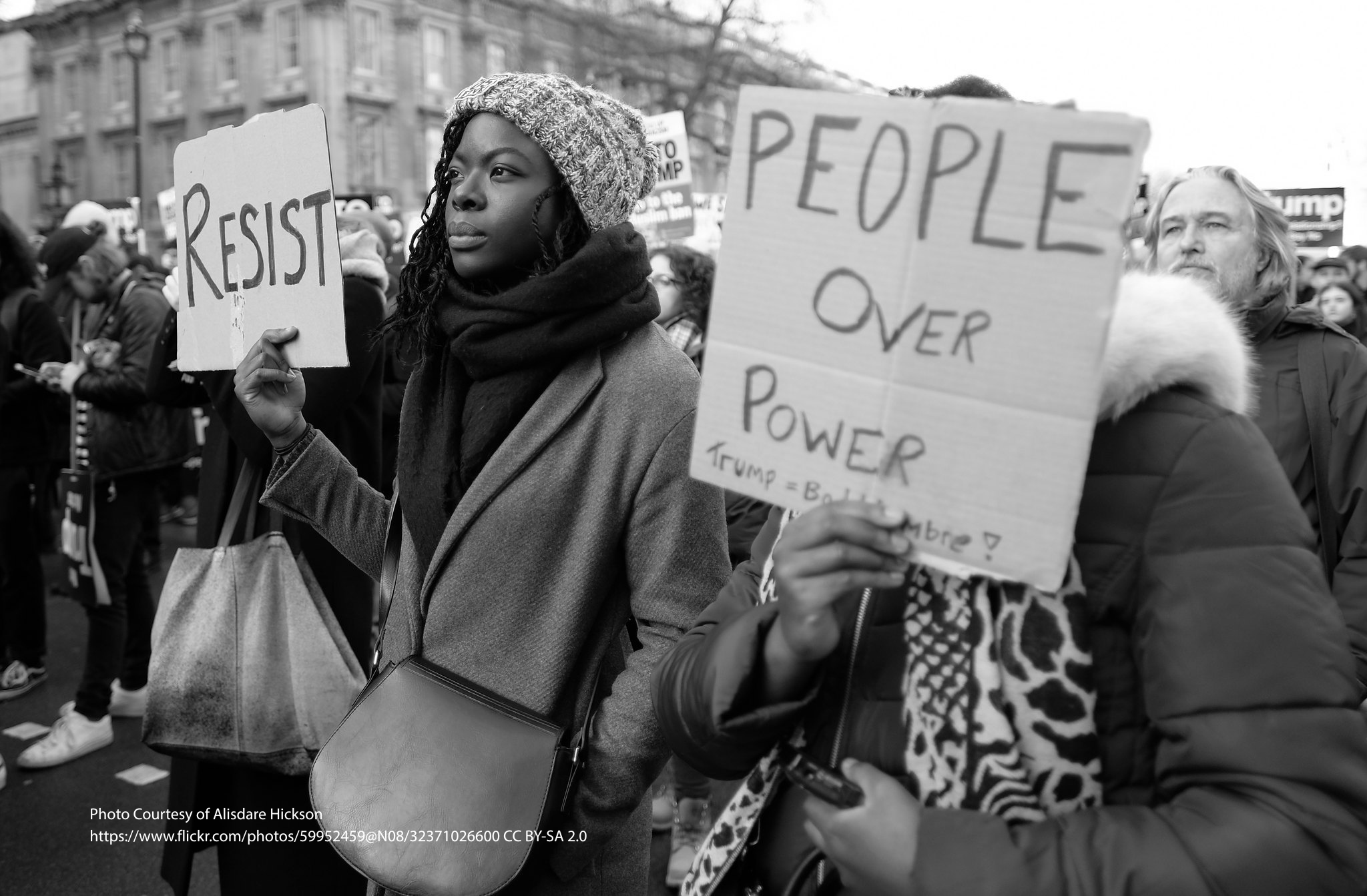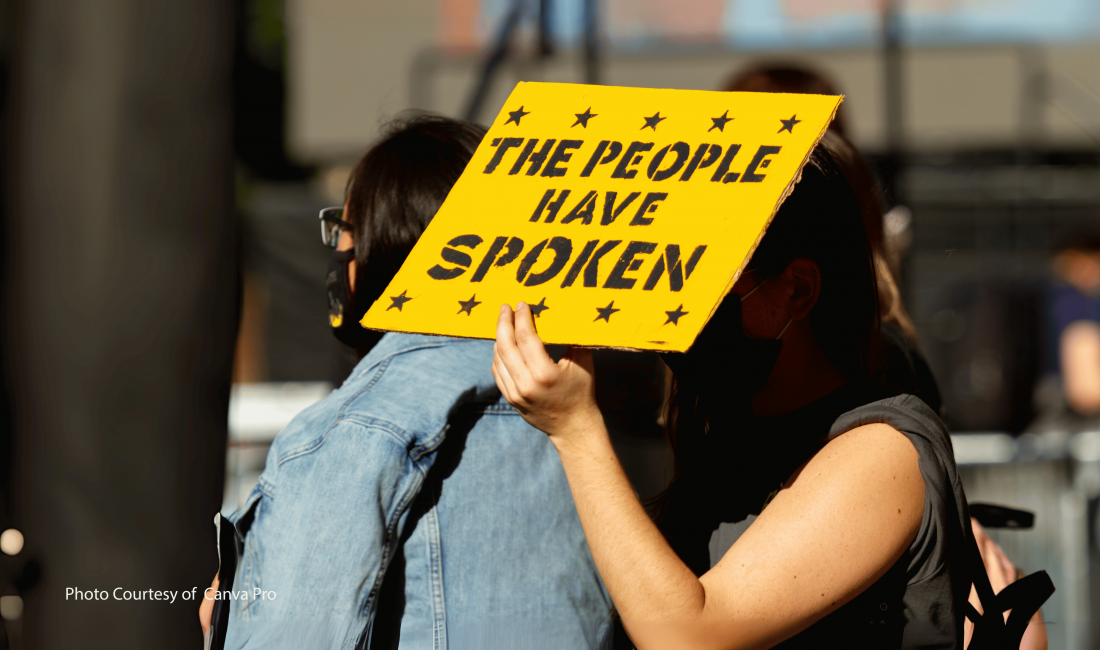Democracy does not vanish overnight; instead, it erodes step by step.
Authoritarianism grows in the cracks, but so does civic resistance. Around the world, civil society is proving that when democratic institutions weaken, people themselves can become the strongest defenders of freedom.
In this month's theme, we explore democratic backsliding, authoritarianism and civil resistance. The first two are trends we see increasingly across regions, while the latter is the response: people are pushing back against authoritarian overreach, which seeks to exploit loopholes and dismantle democratic processes.
Nepal: Youth Resistance and Social Media Censorship
In Nepal, youth took to the streets after the government imposed a sweeping social media ban covering platforms such as Reddit, LinkedIn, WhatsApp, YouTube, Facebook and Instagram.

A decision like this runs counter to the core pillars that define and shape democratic culture: free access to information and the freedom of expression.
The Nepali government's reason for the ban?
A Supreme Court ruling in the country ordered social media companies to register with the Ministry of Communications and Information Technology before the deadline of 3 September 2025. Reasons for the order mainly focused on the government's need to control the spread of:
"misinformation, disinformation and malinformation..."
In addition, the government also cited that social media platforms need to be registered as a means for regulatory authorities to "evaluate and control unwanted content" and essentially hold social media companies "accountable" for the information shared across their respective platforms. This, together with the Social Media Bill 2081, has sparked concern among many regarding its effects on the country's ability to protect citizens' free speech and freedom of expression, which can be further analysed in Joan Barata's insightful article on issues regarding the bill.
The ban also carried economic consequences, as many local businesses rely on social media to operate. While the social media ban triggered protests, the demonstrations were essentially fuelled by deeper frustrations:
Nepotism, high unemployment rates, corruption and persistent discrimination rooted in caste hierarchies.

Nepal's case mirrors a global trend.
State overreach and censorship disguised as efforts to protect citizens, weaken democracy from within by limiting freedoms, undermining trust and eroding the checks that hold leaders accountable.
The Old Tricks of New Autocrats
The playbook of authoritarianism is old: it looks for loopholes to exploit.
More countries around the world are showing similar trends. According to this year's V-Dem report, countries like Türkiye, Georgia and India can be categorised as electoral autocracies. Electoral autocracies in this context can be described as countries which fit the following definition:
"Multiparty elections for the executive exist, insufficient levels of fundamental requisites such as freedom of expression, association, and free and fair elections."
–V-Dem Democracy Report 2025, p.13.
V-Dem's Liberal Democracy Index further illustrates this erosion. All three countries have registered a significant decline in democratic quality, with sharp downward trends in protections such as judicial independence, media freedom and constraints on executive power.
Meanwhile, Kenya represents an interesting case, as the V-Dem report has categorised the country as a 'grey zone', which in this context is defined as:
“Countries belong in this category if confidence intervals overlap making the classification more uncertain."
–V-Dem Democracy Report 2025, p.13.
More simply put, the 'grey zone' that the V-Dem report describes essentially refers to countries that cannot be neatly classified as either an electoral democracy or an electoral autocracy. This is based on the measurement unit V-Dem uses to score and categorise regime types.
Kenya, for example, leans toward the category of an electoral democracy, yet a series of political disputes, institutional weaknesses and episodes of unrest have undermined the quality of the country's democratic processes, highlighting its fragile democratic standing and its V-Dem classification.
These trends reflect broader shifts taking place across political systems worldwide. One such shift is democratic backsliding, where institutions retain a formal democratic façade but are steadily hollowed out from within.
How Democracies Erode from Within
Building on this, Stephan Haggard and Robert Kaufman (2021) highlight three incremental trends:
- Polarisation: The deepening of divisions that erode shared norms.
- Weakening Legislatures: Undermining checks and balances.
- Stealth Regress: Slow, hidden erosion through small legal or procedural changes.
In line with Haggard's and Kaufman's incremental trends, Türkiye, for example, has seen executive aggrandisement steadily erode democratic checks and citizen freedoms. The 2017 constitutional referendum concentrated power within the presidency, including greater control over judicial appointments. Since then, judicial purges and restrictive laws such as Law No.7262 (2020) have tightened government oversight of non-profit organisations.
Meanwhile, in Georgia, the 2024 Law on Transparency of Foreign Influence, which requires non-profit organisations and media with over 20% foreign funding to register as 'serving foreign interests', has drawn comparisons to Russian legislation and sparked mass protests. This could also be labelled as a case of stealth regress framed as technical 'transparency'. Judicial reforms, including the 2021 amendments to the Organic Law on Common Courts, reveal the weakening of legislatures as parliamentary dominance enables executive influence over the judiciary. At the same time, polarising rhetoric around "foreign agents" and increasing use of state resources and media bias have arguably sharpened polarisation within the country and shrunk space for civil society.
These trends show that democratic decline begins within and at the top.
The critical question now becomes:
How can citizens recognise and stop backsliding before it takes root?

Civil Society as Democracy's Safety Valve
Freedom House (2025) warns of an "uphill battle to safeguard rights", reminding us that without citizen engagement, democratic decline accelerates unchecked.
This raises a pressing question:
How do we involve citizens in not only defending but also in strengthening their democratic societies?
Even under pressure, civil society often emerges as democracy's safety valve. In countries such as Türkiye and Georgia, women's groups, student movements, and non-profit organisations continue to mobilise despite shrinking freedoms. Their resistance illustrates that even under executive aggrandisement, citizens are not passive.
Instead, they adapt, organise and contest authoritarian drift.
Recent events in Kenya and India strengthen this picture. In Kenya, youth-led demonstrations surged again this year after the death in custody of blogger and teacher Albert Omondi Ojwang. Mobilised largely through social media, young protesters rallied nationwide against police brutality, corruption and rising living costs. The state responded with force, using tear gas and arrests to curb the protest, yet public pressure compelled the government to investigate the circumstances in which the young blogger and teacher died.
For many people, the first form of democratic expression that comes to mind is protest. Taking to the streets is immediate, visible and emotionally powerful, especially in contexts where trust in courts and political parties are low. Demonstrations can force neglected grievances onto the political agenda, disrupt authoritarian narratives and remind leaders that legitimacy ultimately depends on the people.
While in the case of India, civil society has also taken the lead when institutional avenues proved weak. In West Bengal, thousands of teachers and non-teaching staff launched sustained protests in 2025 over a recruitment scandal that had voided more than 25,000 jobs. Sit-ins and marches pressed the state government to undergo judicial review and negotiations. Additionally, opposition parties and activists mounted protests against Maharashtra's Special Public Security Bill, warning that it threatened fundamental rights.
If backsliding starts at the top, resistance begins at the bottom.
But movements confined to the streets also risk suppression, co-optation or exhaustion. What sustains resistance long-term is the ability to activate multiple layers of civic tools.
Beyond the Streets: Tools for Lasting Democracy
This highlights the importance of incorporating legal, political, participatory and legislative tools into civic pushback.
For example, in South Korea, when former President Yoon Suk Yeol attempted to impose martial law in December 2024, mass mobilisation, parliamentary opposition and judicial review forced a reversal. By April 2025, the Constitutional Court upheld his impeachment and removed him from office.
While protest and litigation are powerful tools, they are also reactive. To strengthen resilience, democratic societies should also provide proactive avenues for citizens to shape decisions before crises reach a breaking point.
This is where direct democracy tools become vital.
Direct democracy mechanisms, such as referenda, citizens' assemblies, participatory budgeting, digital consultations and petitions, allow people to be part of and contribute to agenda-setting before decisions that affect citizens are finalised. These tools not only broaden participation but also help rebuild trust in democratic institutions.
Tools such as petitions and digital consultations can be initiated directly by citizens, while participatory budgeting, referenda and citizens' assemblies, though usually launched by governments, give people the power to propose, debate and vote on key policy decisions and how public resources are used.
At the European level, for example, the European Citizens' Initiative (ECI) gives citizens across the EU the right to propose legislation directly to the European Commission, provided that they gather one million signatures from at least seven member states. Though challenging, the ECI has placed issues such as water as a human right and environmental protection on the European agenda, showing how people can influence policymaking across borders.
At the local level, open-source platforms like Decidem enable residents in Barcelona to propose, debate and vote for policies in real time. These tools not only democratise access to decision-making but also foster transparency and accountability by making the process visible and easily accessible to all those who choose to participate in it.
Together, such mechanisms illustrate how citizen empowerment can move beyond moments of protest into lasting structures of participation. What begins as resistance to backsliding can, through institutionalised tools, become the groundwork for democratic consolidation.




